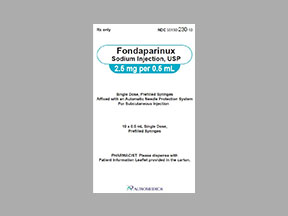
Arixtra Coupons & Savings Card – Discount Prices from $13.98
Brand for: Fondaparinux
My prescription
Edit
0.5ML of 2.5MG/0.5ML, Fondaparinux (1 Syringe)
Select pharmacy

CVS
$22.10
COUPON PRICE
Albertsons
$13.98
COUPON PRICE
Walgreens
$15.58
COUPON PRICE
Walmart
$35.90
COUPON PRICEArixtra savings card
Show this card to your pharmacist
Albertsons
$13.98
BIN
ID
PCN
GRP
019876
LHA89EEE91
CHIPPO
LHX
Powered by
Related anticoagulants prescriptions
More prescriptions for pulmonary embolism
Related anticoagulants prescriptions
More prescriptions for pulmonary embolism
Price history for Arixtra (brand) & Fondaparinux (generic)
1 Syringe, 0.5ML of 2.5MG/0.5ML
Average retail price for Arixtra
Average retail price for Fondaparinux
Average SaveHealth price for Fondaparinux
Our price history data is based on aggregated prescription data collected from participating pharmacies in America. Our prescription data updates daily to reflect the latest price changes. If you notice a missing data point, it means there wasn't sufficient data available to generate a monetary value for that date.
Over the last 12 months, the average discount price of Arixtra is $21.06 using the SaveHealth savings card. That's an average savings of 68.54% on Arixtra with our discount card.
*Retail prices are based on pharmacy claims data, and may not be accurate when we don't have enough claims.
Arixtra (Fondaparinux) dosage forms
Dosage Quantity Price from Per unit 0.4ML of 5MG/0.4ML 1 Syringe $23.19 $23.19 0.4ML of 5MG/0.4ML 2 Syringes $38.87 $19.43 0.4ML of 5MG/0.4ML 3 Syringes $49.59 $16.53 0.5ML of 2.5MG/0.5ML 1 Syringe $13.98 $13.98 0.5ML of 2.5MG/0.5ML 2 Syringes $20.46 $10.23 0.5ML of 2.5MG/0.5ML 3 Syringes $26.94 $8.98 0.6ML of 7.5MG/0.6ML 1 Syringe $23.16 $23.16 0.6ML of 7.5MG/0.6ML 2 Syringes $38.00 $19.00 0.6ML of 7.5MG/0.6ML 3 Syringes $47.85 $15.95 0.8ML of 10MG/0.8ML 1 Syringe $23.19 $23.19
| Dosage | Quantity | Price from | Per unit |
|---|---|---|---|
| 0.4ML of 5MG/0.4ML | 1 Syringe | $23.19 | $23.19 |
| 0.4ML of 5MG/0.4ML | 2 Syringes | $38.87 | $19.43 |
| 0.4ML of 5MG/0.4ML | 3 Syringes | $49.59 | $16.53 |
| 0.5ML of 2.5MG/0.5ML | 1 Syringe | $13.98 | $13.98 |
| 0.5ML of 2.5MG/0.5ML | 2 Syringes | $20.46 | $10.23 |
| 0.5ML of 2.5MG/0.5ML | 3 Syringes | $26.94 | $8.98 |
| 0.6ML of 7.5MG/0.6ML | 1 Syringe | $23.16 | $23.16 |
| 0.6ML of 7.5MG/0.6ML | 2 Syringes | $38.00 | $19.00 |
| 0.6ML of 7.5MG/0.6ML | 3 Syringes | $47.85 | $15.95 |
| 0.8ML of 10MG/0.8ML | 1 Syringe | $23.19 | $23.19 |
| 0.8ML of 10MG/0.8ML | 2 Syringes | $38.87 | $19.43 |
| 0.8ML of 10MG/0.8ML | 3 Syringes | $51.68 | $17.23 |
Is Arixtra the same as Lovenox?
Arixtra and Lovenox are not the same. They are both anticoagulants, but they have different active ingredients and mechanisms of action. Arixtra contains fondaparinux, while Lovenox contains enoxaparin. They are used to prevent and treat blood clots, but their dosing and specific indications may vary. It is important for patients to follow their healthcare provider's instructions regarding which medication to use.
Is Arixtra an anticoagulant or antiplatelet?
Arixtra is an anticoagulant.
What type of anticoagulant is fondaparinux?
Fondaparinux is a synthetic pentasaccharide that acts as a selective inhibitor of factor Xa, an important component in the coagulation cascade. It is classified as an indirect factor Xa inhibitor and is used as an anticoagulant to prevent and treat blood clots.
What class of medication is Arixtra?
Arixtra is classified as an anticoagulant, specifically a factor Xa inhibitor.
Is fondaparinux an anticoagulant or antiplatelet?
Fondaparinux is an anticoagulant.
